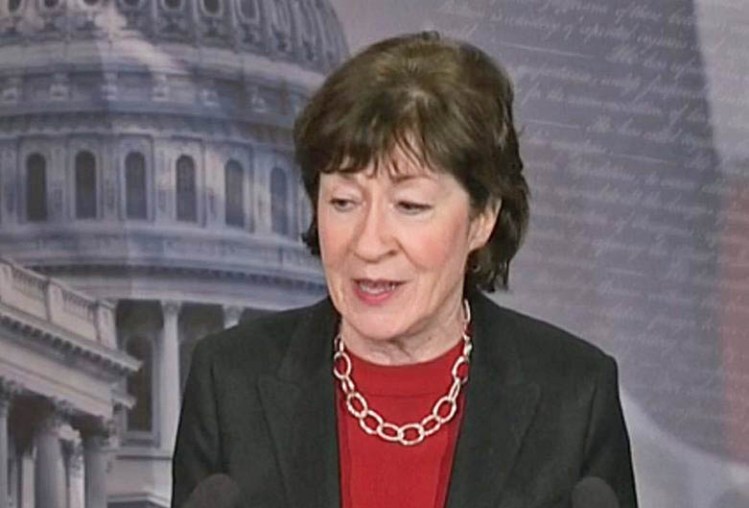Republican Sen. Susan Collins of Maine has sent a letter to Senate Majority Leader Mitch McConnell and Senate Minority Leader Chuck Schumer urging them to preserve the 60-vote threshold to overcome a filibuster when the Senate is considering legislation.
She drew a distinction between using the tactic for legislation and when it is employed for judicial nominees, such as the confirmation of U.S. Supreme Court nominee Neil Gorsuch on Friday.
In the letter, co-authored by Democrat Chris Coons of Delaware and signed by 59 other senators from both parties, as well as independent Angus King of Maine, Collins said that despite what happened this week regarding Gorsuch’s confirmation, “existing rules, practice and traditions” must be preserved.
“Senators have expressed a variety of opinions about the appropriateness of limiting debate when we are considering judicial and executive branch nominations,” Collins wrote. “Regardless of our past disagreements on that issue, we are united in our determination to preserve the ability of members to engage in extended debate when bills are on the Senate floor.”
The filibuster is a legislative tactic used to delay action on bills. Historically, 60 votes are needed to overcome a filibuster. However, this week the Republican-led Senate abandoned that historic practice for Supreme Court nominees in favor of the so-called “nuclear option,” and ended debate over Gorsuch’s nomination with a simple majority.
Gorsuch was then confirmed by the Senate on Friday in a largely party-line vote.
The Republicans’ move likely ensures that in the future more ideological Supreme Court justices will be chosen without consultation with the minority party.
Friday’s letter is a balancing act for Collins, who voted with her fellow Republicans in favor of the nuclear option. In a lengthy statement about her vote Thursday, she said she came to the realization that “the momentum toward this unfortunate end of the judicial filibuster was simply too great to stop.”
But Collins said in an interview Friday that the Senate can and should make a distinction between using filibusters for judicial nominees and filibusters on legislation, which is a more common practice.
“This is important because it helps preserve the tradition of the Senate of respecting minority views and increases likelihood of bipartisan work,” she said.
Collins said the right to filibuster judicial nominations should only be exercised in “extraordinary circumstances,” and she didn’t believe the nomination of Gorsuch, whom she called highly qualified, met that threshold.
Democrats, unwilling to give President Trump’s nominee an easy road, insisted on filibustering Gorsuch. Many are still reeling that Merrick Garland – former President Barack Obama’s nominee to replace the late Justice Antonin Scalia – didn’t even get a hearing, much less a vote. Collins, unlike many Republican colleagues, favored a hearing for Garland.
She also pointed out Friday that she never filibustered any prior Supreme Court nominee and in fact voted for both Justice Elena Kagan and Justice Sonia Sotomayor, two of Obama’s nominees.
“In today’s environment, people criticize me if I walk across the street,” she said.
Following Thursday’s decision by the Republican majority, some feared that ending the filibuster would set a precedent going forward and not just for judicial nominations. It might further polarize what has become an increasingly polarized body.
Collins said she hopes her letter helps address that.
“This letter demonstrates that a majority of the Senate, both Republicans and Democrats, can come together to protect an important tradition of the Senate that recognizes the rights of the minority and makes bipartisan legislation more likely,” she said in a statement. “After the contentious and polarized debate of the past few weeks, I am hopeful that this letter indicates a new determination by a bipartisan group of more than 60 Senators to move forward to solve the pressing problems facing our nation.”
King issued a release Friday evening praising Collins for the letter.
“The 60-vote threshold plays a fundamental role in not only protecting the rights of the minority, but also in encouraging bipartisan activity, which better serves the interests of the country in the long-term,” he said. “I will continue to work with her and our colleagues to ensure that the Senate is able to do the work of the American people in a common-sense, bipartisan manner.”
Added Coons, in a statement: “Democrats want the Senate to work, and we are willing to partner with our colleagues across the aisle if we can get things done for the American people. We have a long way to go to heal the wounds between our two parties, but this letter is a small first step toward that important goal.”
Correction: This story was updated at 11:33 a.m. on April 8 to correct the spelling of Justice Sonia Sotomayor’s name and to clarify that Sen. Collins said she had never filibustered any prior Supreme Court nominee.
Eric Russell can be contacted at 791-6344 or at:
Twitter: PPHEricRussell
Send questions/comments to the editors.




Success. Please wait for the page to reload. If the page does not reload within 5 seconds, please refresh the page.
Enter your email and password to access comments.
Hi, to comment on stories you must . This profile is in addition to your subscription and website login.
Already have a commenting profile? .
Invalid username/password.
Please check your email to confirm and complete your registration.
Only subscribers are eligible to post comments. Please subscribe or login first for digital access. Here’s why.
Use the form below to reset your password. When you've submitted your account email, we will send an email with a reset code.